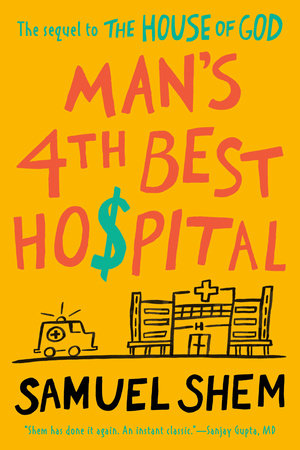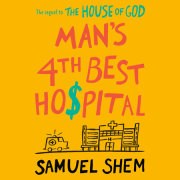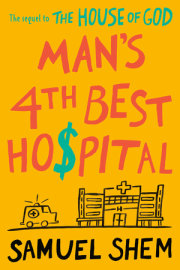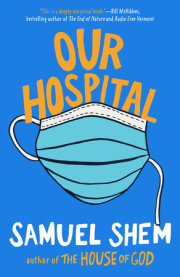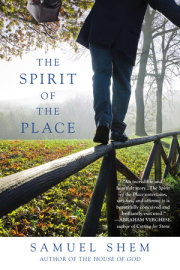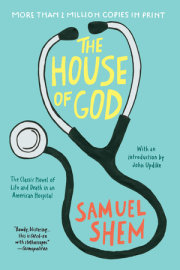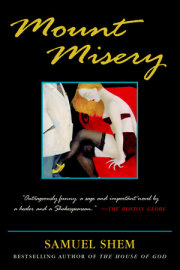I had always wanted to be “the one at the end of the ambulance ride.” Now I figured that even if I might have my usual trouble working in big hierarchical systems, I would never doubt my competence in, and caring about, what I at best called “healing.” And with Fats again? Driving into Man’s 4th Best, I mused on a kind of medical heaven.
I parked in a six-story lot and got lost. I had been here often during med school, but everything had changed. On the crest of a hill, the glorious Art Deco Pink Building and garden and the 1816 neoclassic granite Blue Building were darkened by skyscrapers. I forgot the building name and asked Information for the office of hospital president Jared Krashinsky.
“Oh, that’s your Twitter Building.” She handed me a map, as complex as linguine.
A whispering rocket ride to floor 40 and out. Staggered by the sheets of morning sunlight backlighting a panorama of sea and threads of bleached clouds and then nothing but magical realism blue. The meeting was in the dimly lit, hushed board room, leather and chrome. On a giant bright screen was a slide. As my eyes adjusted, I saw, at a square glass table as big and blocky as my Prius, the Fat Man in a florid and horrific Hawaiian shirt. Beside him was Humbo, a young, compact Hispanic guy in a short white doctor coat. And then what he’d called his “A Team” from the House of God: Eat My Dust Eddie, Chuck, Hyper Hooper, the Runt, and Gath, an Alabama cracker who’d been a surgical resident. A nurse, Angel Jones, the Runt’s wife, sat beside him. I hadn’t seen most of them for many years. Also, a woman doctor, I guessed from India. I slipped into a seat. Panting, wiping off sweat. Way late.
Jared Tristram Krashinsky, of the Lithuanian Krashinskys, Man’s 4th Best president and titan of industry, stood at a lit screen in dim light, a power suit reading a PowerPoint:
“—this slide shows Core Concept One: Mobile Self-Management. Notice the two-headed arrow. I manage up, and I manage down. Man’s Best Hospital uses world-class managerial material of the BBS—the Best Business School. I use both hard and soft power. I go down hard. I come up soft, and—”
“Hraaak-a-hraaak!” coughed Eat My Dust Eddie, our giant, red-haired, wild-man master of irony, straight from a lucrative Newport Beach cancer practice and wife-lucrative divorce. He kept fake-hraaacking and, doubled over, exited.
The Krash stopped. Pissed at Eddie? Nope. He was staring at the screen calmly, with eyes closed, smiling, sucking on something. He was a short, fit-looking guy with a handsome face—lips plump, dimpled cheeks, and, for Lithuania, a reasonable nose. Silky dark hair carefully cut, combed over. Appealing, in a boyish way. He was what my immigrant grandmother, Molly, had called me, in Yiddish, a “zeesa boyala”—a sweet boy.
I looked around. My guys had been sitting there listening to him for a while. They did not look happy, rolling their eyes at one another and me.
Krash shifted the sucking into a pouch of a cheek.
“You may be wondering why I’m waiting, as if I’m doing nothing. I’m not. I’m doing Core Concept Two: Maximum Meditative Mindfulness. Man’s Best Wellness Program, directed by Bernard, Llama Llassi. Nickname, Mango. Mango Lassi.” No one laughed. Click. And there he was, Mango Llassi: shaven head, a diamond in his nose, looking like everybody’s Uncle Louie.
“What if my religion prohibits meditation?” asked Runt. He’d come into the internship mortally scared of doctoring. In Denver Runt had become an orthodox Freudian psychoanalyst. Now he was wearing a lime green bicycle helmet, as if a lid for his id. “What if it prohibits Mango Lassi?”
“Why, then, you, so to speak”—Krash smiled, a boyish smile meant to be friendly—“choose your poison. Or none at all.”
“Y’mean, man,” Chuck said, “if the sacred ain’t sacred to you at all?” He was black, a gentle soul, a magical basketball player and singer, from a poor family of eight in Memphis. At first the higher-ups thought he was just a dumb affirmative action guy. But he was the best doc of us all—and the kindest. He and I loved to play basketball and drink. Looking back, our internship floated in alcohol! I’d come to love Chuck. Now I was startled by the touch of gray in that “cool”-cut hair. Last I heard he’d gone home to Memphis to be a family doc. He was not the kind to stay in touch.
“If it’s not sacred,” Krash said, “try the ‘No-Name Chapel.’”
“But!” cried Hyper Hooper, our high-octane, competitive manic from California, rocking back and forth. His mustache had gone gray, his wavy hair receding. He’d been “into death,” winning the prize for most autopsies. But by the end he’d succumbed to MOR—Marriage on the Rocks—separated from his Sausalito wife, and taken up with an Israeli pathologist in the morgue. He wound up in LA, and through an aqua-nude-couples therapy group, he had repaired the marriage, had kids. A science genius and skeptic about Big Pharma, he’d founded at UCLA the Hyper-Winfrey Nutrition Center, and published a bestseller: Eat Red, Live Long.
“But but but!” he went on. “The quote ‘No-Name Chapel’ is a name. Faulty logic.”
“Holy shit!” cried Runt. “And Jesus Christ!”
Gath, our House surgeon, now a Man’s 4th Best orthopedic surgeon, grabbed Runt, surgically whispered in his ear. Runt quieted right down.
“Goodgood,” Krash said calmly. Click. On he droned: “‘My plan is six ambitious capital tranches . . . derivatives trending to seven aspirational targets at a min 20 per . . .”
I looked around the table. We’re back! The heart of our team, right here, right now. Back in the foxhole together with the guys you never forget but you rarely stay in touch with after—for fear that they’d changed or that they’d not. With one another, we are known. Things had happened. Life had happened.
We had staggered out of our internships and scattered. Each of us with a sense of failure. Down on hope. It would turn out that each of us had done our best to patch up our lives and move on. But we were not doing all that well. And then who should show up? Fats! Was he too still hurting and drifting? I looked at him. He was beaming! Here he was, going full blast into new life. Wanting to do it over again with us, do it good.
“This will be different,” he had said, “because I’ll have the money and power. Man’s 4th Best is at my mercy. Our clinic’s gonna be a bullshit-free zone.”
All at once I felt hope. Not blind hope, but tattered hope, cautious hope—and yet hope nonetheless. All bound up again with our gargantuan leader.
We’re here, hope rising. We’ll be free together. A thrill went through me. Buckle up.
Later, Fats would tell us about Jared T. Krashinsky—a childhood friend. Raised in Brooklyn on high-test yeshiva. His pop a slumlord in Jersey, Mom a force in Hadassah. Pop gave 2 million bucks to the Best College to get Krash in. But Krash quit and enlisted in the Israeli Army for two years—trained as a sniper. Married a sabra soldier, had children, Tel Aviv college. Went to med school on the island of Grenada, but quit. Transferred to the BBS—the Best Business School. There, his nickname was Kopf-Flaum-radfahrer—“head-down cyclist”—he walked around head tucked down over phantom handlebars, no eye contact. Classmates never heard him speak in class. Ever. After class, he disappeared.
Now he was taking off his suit jacket, rolling up his sleeves and—surprise!—big biceps? Buff torso? A bodybuilder? Sucking androgens? How had this Jewish nondoctor been picked by a high-WASP board for president of Man’s 4th Best Hospital?
Well, boards of directors are selected not only for their big money, but to make sure that nothing ever changes. They run on fear. Their logic? If you’re on the board of the “best” anything, anything you do can only screw it up—send it down to “less than best.” Their core concept? “Do nothing and make more money.” And so when Man’s Best began to go broke, and fell to Man’s 4th, the board vowed drastic changes. They would do this by making sure that nothing changes. And they found their man: Krash would change nothing but the optics, the branding. He had rich contacts from decades of work in General Electric’s tax division. A lone accountant, he’d been the boss of 1,000 tax lawyers? Making sure GE, the world’s largest corporation, would pay no taxes. He became a star. Articles were written about him, trumpeting him as “The Man Who Made GE Tax-Free.”
Now on the screen was Core Concept Three: Screens Are Clarity.
“Man’s Best sees clearly through screens. Man’s Best bills clearly through screens. Maximally, and trending. You, like us all, will see and bill through screens. Computer screens. Our dedicated screen runs on HEAL: H-E-A-L. Our EHR, Electronic Health Record. For billing. All of Man’s Best’s billing. We monetize.”
Gath asked, “An’ can y’all tell us whut the lettahs stand fo’?”
“Yeah,” mused Eat My Dust, twirling what looked like an old-fashioned blackjack or rachet wrench on a finger, “like, maybe, ‘How Eager Admins Live’?”
“Or,” Hyper rocked, “‘Happy Endings for Aging Ladies’—and great autopsies?”
“I googled it,” said the Runt, “but all I got here is a laxative from Mexico.”
“Cut the shit!” Krash barked. “I know all about you guys. I know how notorious you all got after that novel came out. I know how you cultivated that notoriety—“ A glance at his watch, a smile. “Goodgood. Gotta hop, time to stop. I’ll turn this over to Pat—”
“Never happen,” said Chuck in a voice that landed.
“What?”
“Fall into line?” He looked around to each of us. “Never happen. Right, guys?”
“Never happen never happen never happen” flew around the table real fast.
“Before you ‘hop,’” I said, “can you tell us what the letters of HEAL do stand for?”
“Why, I don’t know.”
“Healthy Electronic Assistance Link.” A clipped, clear, confident woman’s voice.
“Thanks, Pat,” said Krash. “HEAL. For billing. Pat, take it from here.”
“Wait a sec, Krash,” Fats said. “You haven’t mentioned the words ‘patient’ or ‘care.’ Nothing about ‘service.’ Is the purpose of HEAL to bill and not good patient care?”
“The answer is yes.”
“Yes what?”
“HEAL is primarily for billing and primarily to deliver good patient care. So I use—”
“Logical contradiction!” shouted Hooper, twitching. “Mutually exclusive.”
“That’s old thought,” Krash snapped. “Aristotelian logic. Not quantum logic, where you can be in two different places at the same time, like Schrödinger’s cat.”
We rolled our eyes. Whoa! Who’s cat?
“Screen logic. You’ll each be given an iTablet containing all the information in medicine. You don’t have to remember anything. Just clickclickclick. Our interns do eight thousand clicks per twelve-hour shift—best in America. We did a survey of house staff: ‘What’s the minimum percent on their shift they spend in front of screens? Eighty! Eighty percent of their time in my hospital they’re in front of screens. Eighty percent minimum.” His silhouette trembled with excitement. “Some say ninety percent. Minimum.”
“And so,” Fats said, “if they spend, say, five percent in eating and pooping, how much time is left for face-to-face patient care?”
“Day-shift, nine percent max. Night shift, less. Depending.”
“That is quite disgusting,” said the new woman, with a British-Indian accent. Fats had mentioned there would be at least one woman doctor on our team—and pledged more. Her name was Naidoo and we would come to know her as a brilliant woman of integrity, her life devoted to building “compassionate communities of resistance.” “I for one—and I hope we all—resist this, the supremacy of screens, with all our power.”
The boardroom went dead quiet. I loved her—looking back, we all loved her.
How would Krash respond to this challenge to everything he had said?
We watched as in silhouette against the glittering dead white screen, his chest rose, paused, fell. Maybe, just maybe, he would take Naidoo’s challenge as an invitation to some human stuff? I felt sorry for him. Under cannibal pressure at work, what kind of life could he have? As Man’s 4th Best president, he had to hide under that ice, all the while projecting “Goodgoods.” I found myself rooting for him. C’mon, Krash, you can do it—be human!
He clicked off the screen. Lights up. “My mission as president is to serve. Service.”
Again we were startled. Would he finally mention service to patients?
“My service to Man’s Best . . .” He paused, choked up. Clearing his throat, he went on. “My service is to make Man’s Best Hospital the best bio-pharma ecosystem in the world.”
I was stunned. Not to serve the patients, the sick? I looked around. Disbelief.
He was trending toward the glass door. Fats, with dancing-bear light steps, got there first—he’d always gotten to every “there” first—and blocked his exit, Humbo alongside.
“Hold it,” Fats said. Krash looked stunned. Fats loomed over him, flag-sized tropical-flower shirt making him seem a powerful Hawaiian king confronting a Dole Fruit guy intent on stealing not just pineapples but Hawaii. Fats turned to us. “Okay, team, go on ahead. I’ll meet you in our clinic in a half hour.” Then, looking Krash up and down as if sizing up a steak, said, “Nah. Meet me there tomorrow at seven sharp.”
Pat—a solid, short woman who was pretty pretty and pretty much gender-neutral in hair, makeup, build, and pinstripes—showed us out. As we left, we heard the Fat Man shouting in a strange guttural language—Yiddish?—and Krash shouting gutturally back.
“Anyhoo, everything I could tell you is on your smartphone anyways. Use it.”
“What if you have a dumb phone?” I asked. I took out my ancient flip phone.
“You . . . a ‘Medicaid’ phone we give out free to the poor? That does nothin’. Good luck.”
Chuck, Gath, Hooper, Eddie, the Runt and Angel, Naidoo, and I went looking for the building housing our new clinic, the FMC. We got lost, winding up in a spanking-new corridor—ur-glass, -chrome, -light, and -tech. Large computer screens, with retractable keyboards at eye level, spaced at decorous intervals along one long mauve wall.
A team of interns and residents was making rounds. On one side of the Lysoled, LED-lit hallway were nine figures in short white coats. On the other side, a lone woman in long white. They stood at nine portable rolling tables that are used to swivel trays of food over patients’ laps. We got closer. On each tray was an open laptop. They didn’t notice us. A sepulchral silence, broken only by the lone woman typing like crazy, click-clicketty-CLICK. We threaded our way through them, unnoticed, and walked on.
Copyright © 2019 by Samuel Shem. All rights reserved. No part of this excerpt may be reproduced or reprinted without permission in writing from the publisher.

